Examining Unethical Practices: A Detailed Analysis of Engineering
VerifiedAdded on 2023/05/29
|7
|1752
|410
Essay
AI Summary
This essay delves into a case of unethical behavior within an engineering company, specifically focusing on a previous group financial controller's involvement in overcharging customers. The analysis identifies the emphasis on self-gain and short-term business objectives as primary drivers of this misconduct. The essay proposes several courses of action to address and prevent such behavior, including fostering moral sensitivity, promoting moral judgment, and developing a strong moral character among employees. It emphasizes the importance of rigorous section tests, enforcing a clear code of conduct, and establishing an integrity-driven culture within the workplace. The essay also highlights the role of leadership in setting an ethical tone and the necessity of reporting unethical behavior to higher levels of management. Ultimately, the essay concludes that cultivating moral judgment and promoting ethical behavior are crucial for the long-term success and integrity of the engineering company.

1
Ethics
Ethics
Paraphrase This Document
Need a fresh take? Get an instant paraphrase of this document with our AI Paraphraser
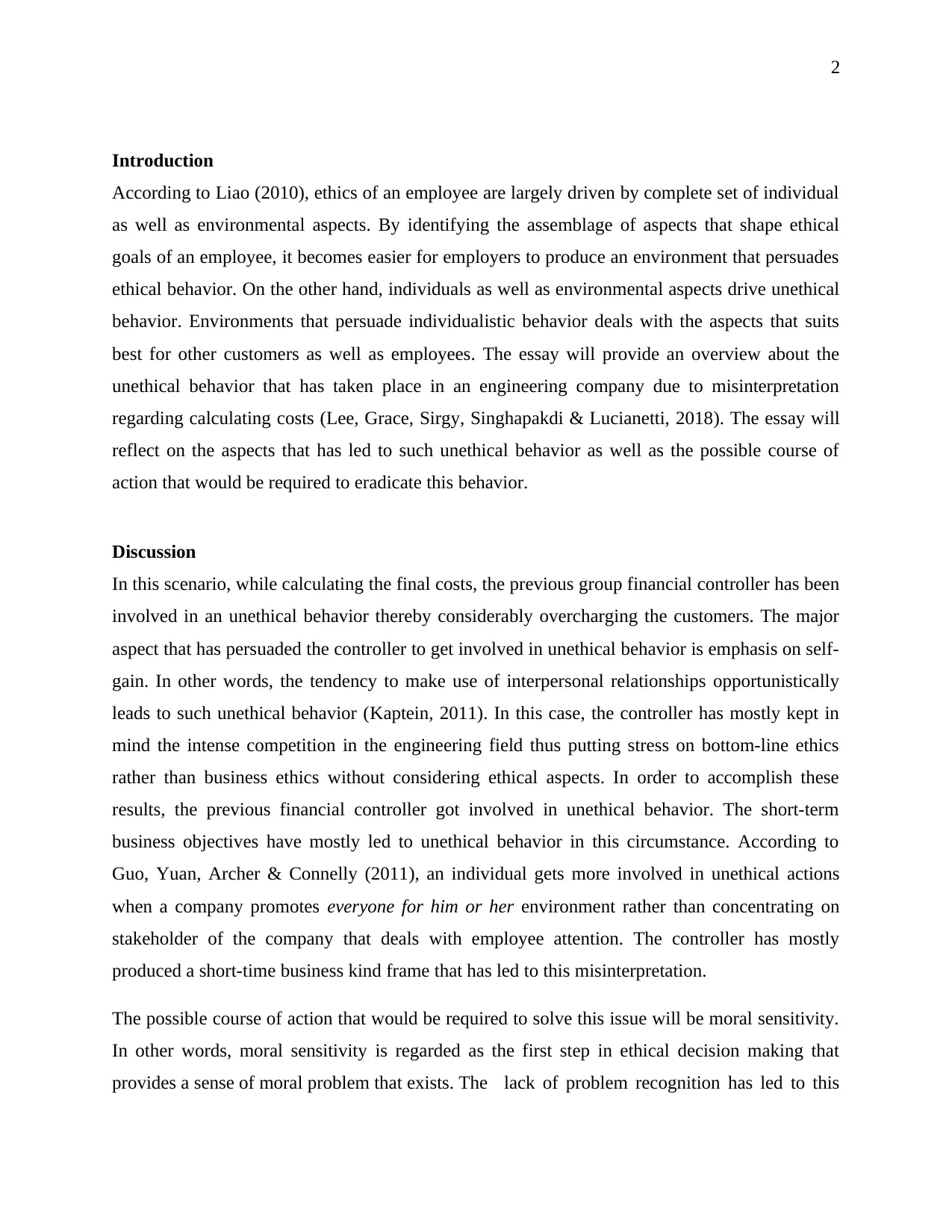
2
Introduction
According to Liao (2010), ethics of an employee are largely driven by complete set of individual
as well as environmental aspects. By identifying the assemblage of aspects that shape ethical
goals of an employee, it becomes easier for employers to produce an environment that persuades
ethical behavior. On the other hand, individuals as well as environmental aspects drive unethical
behavior. Environments that persuade individualistic behavior deals with the aspects that suits
best for other customers as well as employees. The essay will provide an overview about the
unethical behavior that has taken place in an engineering company due to misinterpretation
regarding calculating costs (Lee, Grace, Sirgy, Singhapakdi & Lucianetti, 2018). The essay will
reflect on the aspects that has led to such unethical behavior as well as the possible course of
action that would be required to eradicate this behavior.
Discussion
In this scenario, while calculating the final costs, the previous group financial controller has been
involved in an unethical behavior thereby considerably overcharging the customers. The major
aspect that has persuaded the controller to get involved in unethical behavior is emphasis on self-
gain. In other words, the tendency to make use of interpersonal relationships opportunistically
leads to such unethical behavior (Kaptein, 2011). In this case, the controller has mostly kept in
mind the intense competition in the engineering field thus putting stress on bottom-line ethics
rather than business ethics without considering ethical aspects. In order to accomplish these
results, the previous financial controller got involved in unethical behavior. The short-term
business objectives have mostly led to unethical behavior in this circumstance. According to
Guo, Yuan, Archer & Connelly (2011), an individual gets more involved in unethical actions
when a company promotes everyone for him or her environment rather than concentrating on
stakeholder of the company that deals with employee attention. The controller has mostly
produced a short-time business kind frame that has led to this misinterpretation.
The possible course of action that would be required to solve this issue will be moral sensitivity.
In other words, moral sensitivity is regarded as the first step in ethical decision making that
provides a sense of moral problem that exists. The lack of problem recognition has led to this
Introduction
According to Liao (2010), ethics of an employee are largely driven by complete set of individual
as well as environmental aspects. By identifying the assemblage of aspects that shape ethical
goals of an employee, it becomes easier for employers to produce an environment that persuades
ethical behavior. On the other hand, individuals as well as environmental aspects drive unethical
behavior. Environments that persuade individualistic behavior deals with the aspects that suits
best for other customers as well as employees. The essay will provide an overview about the
unethical behavior that has taken place in an engineering company due to misinterpretation
regarding calculating costs (Lee, Grace, Sirgy, Singhapakdi & Lucianetti, 2018). The essay will
reflect on the aspects that has led to such unethical behavior as well as the possible course of
action that would be required to eradicate this behavior.
Discussion
In this scenario, while calculating the final costs, the previous group financial controller has been
involved in an unethical behavior thereby considerably overcharging the customers. The major
aspect that has persuaded the controller to get involved in unethical behavior is emphasis on self-
gain. In other words, the tendency to make use of interpersonal relationships opportunistically
leads to such unethical behavior (Kaptein, 2011). In this case, the controller has mostly kept in
mind the intense competition in the engineering field thus putting stress on bottom-line ethics
rather than business ethics without considering ethical aspects. In order to accomplish these
results, the previous financial controller got involved in unethical behavior. The short-term
business objectives have mostly led to unethical behavior in this circumstance. According to
Guo, Yuan, Archer & Connelly (2011), an individual gets more involved in unethical actions
when a company promotes everyone for him or her environment rather than concentrating on
stakeholder of the company that deals with employee attention. The controller has mostly
produced a short-time business kind frame that has led to this misinterpretation.
The possible course of action that would be required to solve this issue will be moral sensitivity.
In other words, moral sensitivity is regarded as the first step in ethical decision making that
provides a sense of moral problem that exists. The lack of problem recognition has led to this
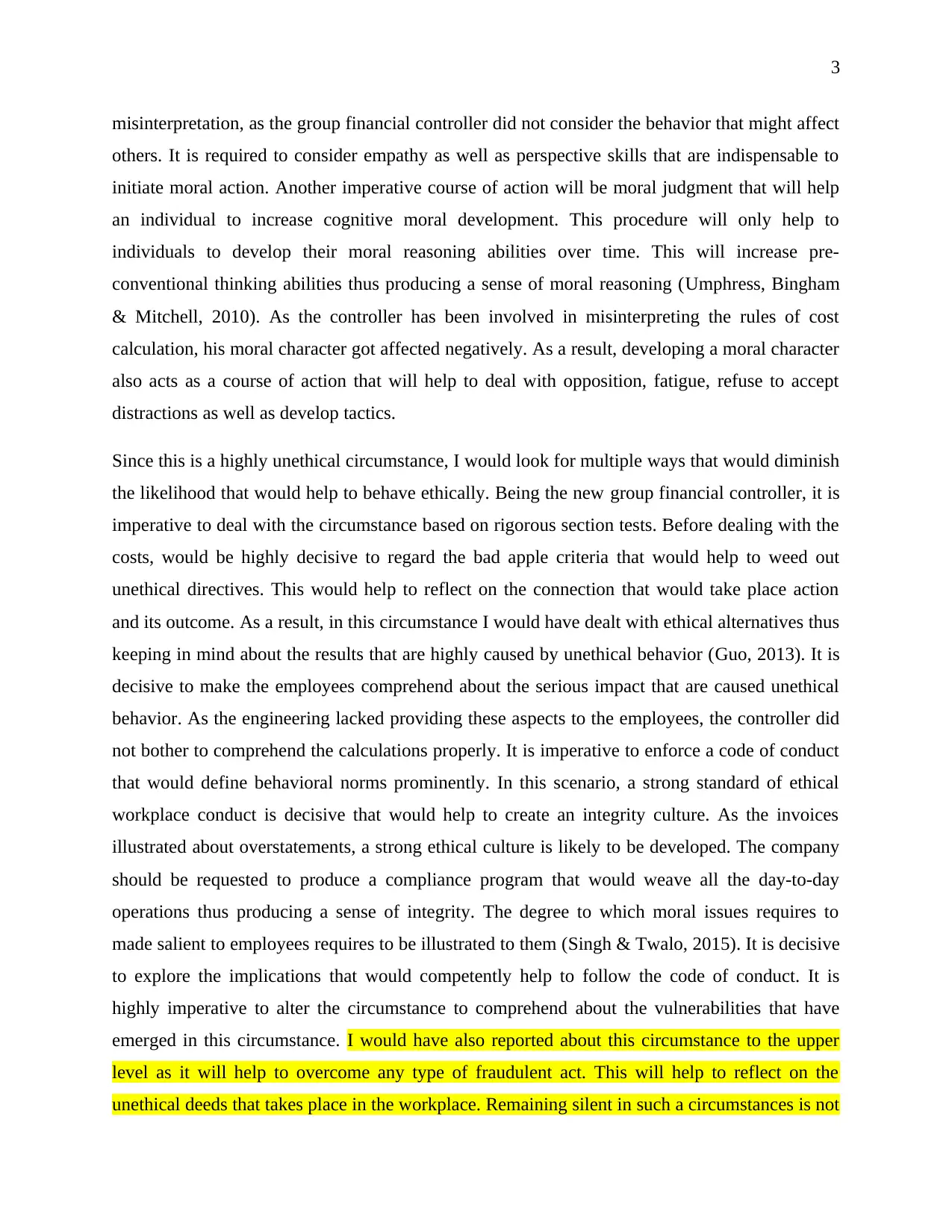
3
misinterpretation, as the group financial controller did not consider the behavior that might affect
others. It is required to consider empathy as well as perspective skills that are indispensable to
initiate moral action. Another imperative course of action will be moral judgment that will help
an individual to increase cognitive moral development. This procedure will only help to
individuals to develop their moral reasoning abilities over time. This will increase pre-
conventional thinking abilities thus producing a sense of moral reasoning (Umphress, Bingham
& Mitchell, 2010). As the controller has been involved in misinterpreting the rules of cost
calculation, his moral character got affected negatively. As a result, developing a moral character
also acts as a course of action that will help to deal with opposition, fatigue, refuse to accept
distractions as well as develop tactics.
Since this is a highly unethical circumstance, I would look for multiple ways that would diminish
the likelihood that would help to behave ethically. Being the new group financial controller, it is
imperative to deal with the circumstance based on rigorous section tests. Before dealing with the
costs, would be highly decisive to regard the bad apple criteria that would help to weed out
unethical directives. This would help to reflect on the connection that would take place action
and its outcome. As a result, in this circumstance I would have dealt with ethical alternatives thus
keeping in mind about the results that are highly caused by unethical behavior (Guo, 2013). It is
decisive to make the employees comprehend about the serious impact that are caused unethical
behavior. As the engineering lacked providing these aspects to the employees, the controller did
not bother to comprehend the calculations properly. It is imperative to enforce a code of conduct
that would define behavioral norms prominently. In this scenario, a strong standard of ethical
workplace conduct is decisive that would help to create an integrity culture. As the invoices
illustrated about overstatements, a strong ethical culture is likely to be developed. The company
should be requested to produce a compliance program that would weave all the day-to-day
operations thus producing a sense of integrity. The degree to which moral issues requires to
made salient to employees requires to be illustrated to them (Singh & Twalo, 2015). It is decisive
to explore the implications that would competently help to follow the code of conduct. It is
highly imperative to alter the circumstance to comprehend about the vulnerabilities that have
emerged in this circumstance. I would have also reported about this circumstance to the upper
level as it will help to overcome any type of fraudulent act. This will help to reflect on the
unethical deeds that takes place in the workplace. Remaining silent in such a circumstances is not
misinterpretation, as the group financial controller did not consider the behavior that might affect
others. It is required to consider empathy as well as perspective skills that are indispensable to
initiate moral action. Another imperative course of action will be moral judgment that will help
an individual to increase cognitive moral development. This procedure will only help to
individuals to develop their moral reasoning abilities over time. This will increase pre-
conventional thinking abilities thus producing a sense of moral reasoning (Umphress, Bingham
& Mitchell, 2010). As the controller has been involved in misinterpreting the rules of cost
calculation, his moral character got affected negatively. As a result, developing a moral character
also acts as a course of action that will help to deal with opposition, fatigue, refuse to accept
distractions as well as develop tactics.
Since this is a highly unethical circumstance, I would look for multiple ways that would diminish
the likelihood that would help to behave ethically. Being the new group financial controller, it is
imperative to deal with the circumstance based on rigorous section tests. Before dealing with the
costs, would be highly decisive to regard the bad apple criteria that would help to weed out
unethical directives. This would help to reflect on the connection that would take place action
and its outcome. As a result, in this circumstance I would have dealt with ethical alternatives thus
keeping in mind about the results that are highly caused by unethical behavior (Guo, 2013). It is
decisive to make the employees comprehend about the serious impact that are caused unethical
behavior. As the engineering lacked providing these aspects to the employees, the controller did
not bother to comprehend the calculations properly. It is imperative to enforce a code of conduct
that would define behavioral norms prominently. In this scenario, a strong standard of ethical
workplace conduct is decisive that would help to create an integrity culture. As the invoices
illustrated about overstatements, a strong ethical culture is likely to be developed. The company
should be requested to produce a compliance program that would weave all the day-to-day
operations thus producing a sense of integrity. The degree to which moral issues requires to
made salient to employees requires to be illustrated to them (Singh & Twalo, 2015). It is decisive
to explore the implications that would competently help to follow the code of conduct. It is
highly imperative to alter the circumstance to comprehend about the vulnerabilities that have
emerged in this circumstance. I would have also reported about this circumstance to the upper
level as it will help to overcome any type of fraudulent act. This will help to reflect on the
unethical deeds that takes place in the workplace. Remaining silent in such a circumstances is not
⊘ This is a preview!⊘
Do you want full access?
Subscribe today to unlock all pages.

Trusted by 1+ million students worldwide
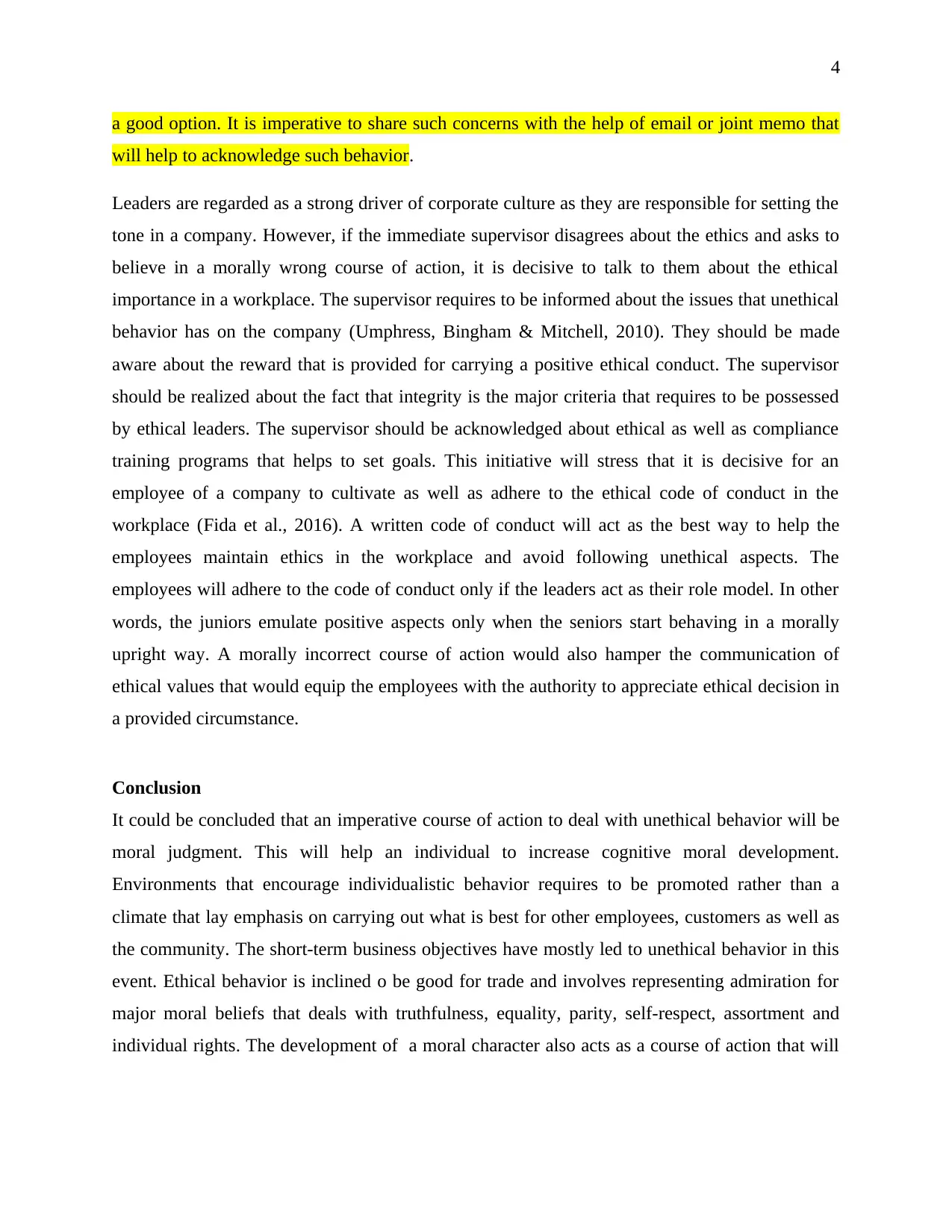
4
a good option. It is imperative to share such concerns with the help of email or joint memo that
will help to acknowledge such behavior.
Leaders are regarded as a strong driver of corporate culture as they are responsible for setting the
tone in a company. However, if the immediate supervisor disagrees about the ethics and asks to
believe in a morally wrong course of action, it is decisive to talk to them about the ethical
importance in a workplace. The supervisor requires to be informed about the issues that unethical
behavior has on the company (Umphress, Bingham & Mitchell, 2010). They should be made
aware about the reward that is provided for carrying a positive ethical conduct. The supervisor
should be realized about the fact that integrity is the major criteria that requires to be possessed
by ethical leaders. The supervisor should be acknowledged about ethical as well as compliance
training programs that helps to set goals. This initiative will stress that it is decisive for an
employee of a company to cultivate as well as adhere to the ethical code of conduct in the
workplace (Fida et al., 2016). A written code of conduct will act as the best way to help the
employees maintain ethics in the workplace and avoid following unethical aspects. The
employees will adhere to the code of conduct only if the leaders act as their role model. In other
words, the juniors emulate positive aspects only when the seniors start behaving in a morally
upright way. A morally incorrect course of action would also hamper the communication of
ethical values that would equip the employees with the authority to appreciate ethical decision in
a provided circumstance.
Conclusion
It could be concluded that an imperative course of action to deal with unethical behavior will be
moral judgment. This will help an individual to increase cognitive moral development.
Environments that encourage individualistic behavior requires to be promoted rather than a
climate that lay emphasis on carrying out what is best for other employees, customers as well as
the community. The short-term business objectives have mostly led to unethical behavior in this
event. Ethical behavior is inclined o be good for trade and involves representing admiration for
major moral beliefs that deals with truthfulness, equality, parity, self-respect, assortment and
individual rights. The development of a moral character also acts as a course of action that will
a good option. It is imperative to share such concerns with the help of email or joint memo that
will help to acknowledge such behavior.
Leaders are regarded as a strong driver of corporate culture as they are responsible for setting the
tone in a company. However, if the immediate supervisor disagrees about the ethics and asks to
believe in a morally wrong course of action, it is decisive to talk to them about the ethical
importance in a workplace. The supervisor requires to be informed about the issues that unethical
behavior has on the company (Umphress, Bingham & Mitchell, 2010). They should be made
aware about the reward that is provided for carrying a positive ethical conduct. The supervisor
should be realized about the fact that integrity is the major criteria that requires to be possessed
by ethical leaders. The supervisor should be acknowledged about ethical as well as compliance
training programs that helps to set goals. This initiative will stress that it is decisive for an
employee of a company to cultivate as well as adhere to the ethical code of conduct in the
workplace (Fida et al., 2016). A written code of conduct will act as the best way to help the
employees maintain ethics in the workplace and avoid following unethical aspects. The
employees will adhere to the code of conduct only if the leaders act as their role model. In other
words, the juniors emulate positive aspects only when the seniors start behaving in a morally
upright way. A morally incorrect course of action would also hamper the communication of
ethical values that would equip the employees with the authority to appreciate ethical decision in
a provided circumstance.
Conclusion
It could be concluded that an imperative course of action to deal with unethical behavior will be
moral judgment. This will help an individual to increase cognitive moral development.
Environments that encourage individualistic behavior requires to be promoted rather than a
climate that lay emphasis on carrying out what is best for other employees, customers as well as
the community. The short-term business objectives have mostly led to unethical behavior in this
event. Ethical behavior is inclined o be good for trade and involves representing admiration for
major moral beliefs that deals with truthfulness, equality, parity, self-respect, assortment and
individual rights. The development of a moral character also acts as a course of action that will
Paraphrase This Document
Need a fresh take? Get an instant paraphrase of this document with our AI Paraphraser
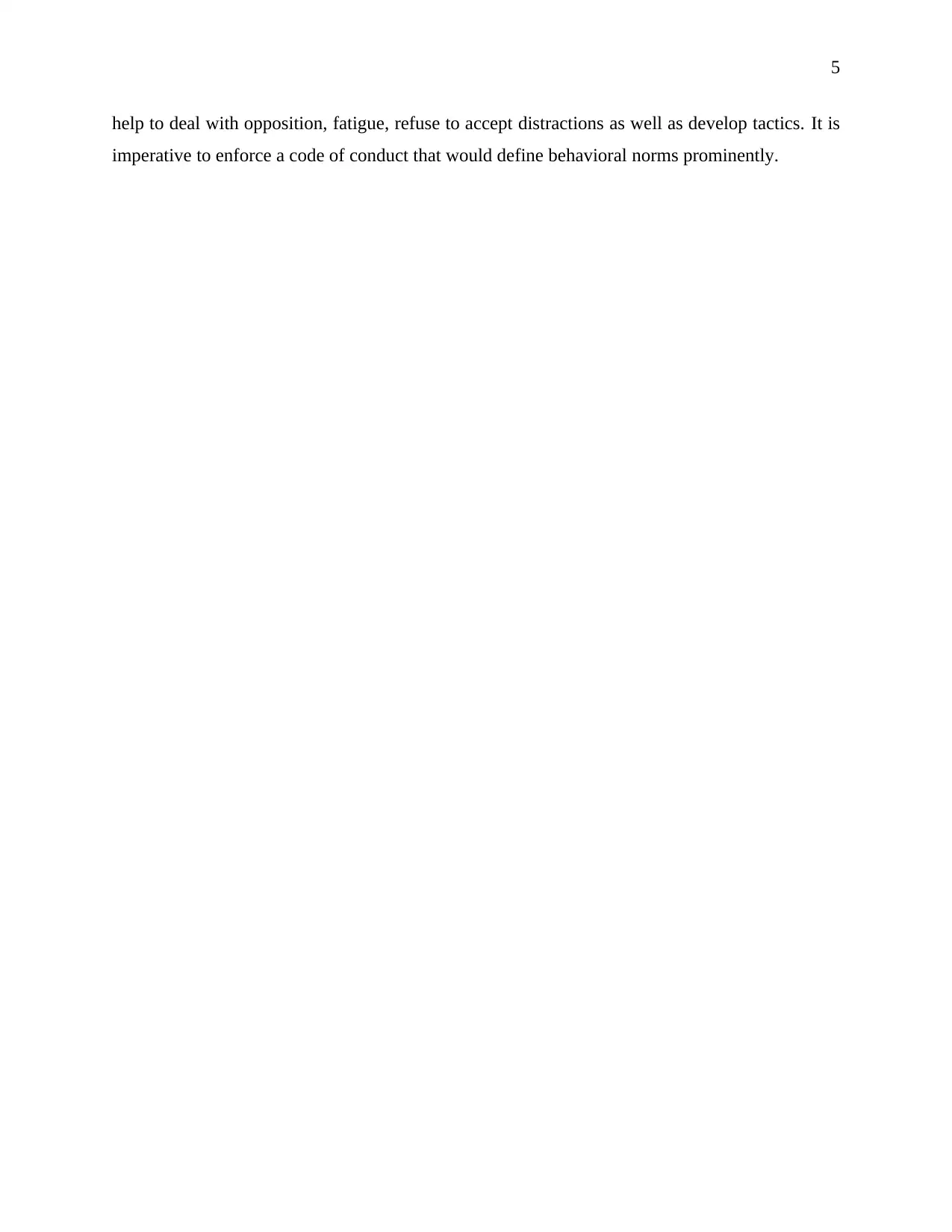
5
help to deal with opposition, fatigue, refuse to accept distractions as well as develop tactics. It is
imperative to enforce a code of conduct that would define behavioral norms prominently.
help to deal with opposition, fatigue, refuse to accept distractions as well as develop tactics. It is
imperative to enforce a code of conduct that would define behavioral norms prominently.
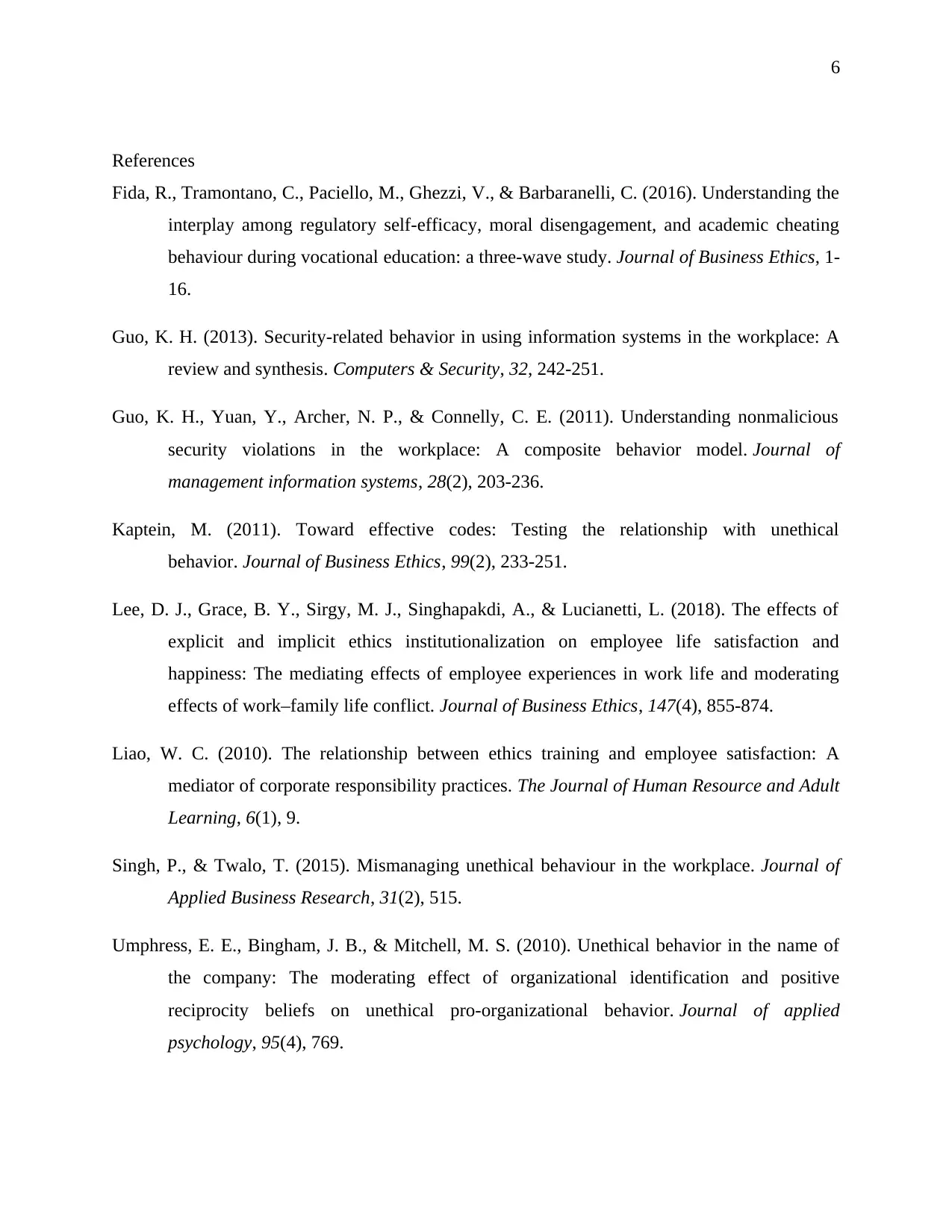
6
References
Fida, R., Tramontano, C., Paciello, M., Ghezzi, V., & Barbaranelli, C. (2016). Understanding the
interplay among regulatory self-efficacy, moral disengagement, and academic cheating
behaviour during vocational education: a three-wave study. Journal of Business Ethics, 1-
16.
Guo, K. H. (2013). Security-related behavior in using information systems in the workplace: A
review and synthesis. Computers & Security, 32, 242-251.
Guo, K. H., Yuan, Y., Archer, N. P., & Connelly, C. E. (2011). Understanding nonmalicious
security violations in the workplace: A composite behavior model. Journal of
management information systems, 28(2), 203-236.
Kaptein, M. (2011). Toward effective codes: Testing the relationship with unethical
behavior. Journal of Business Ethics, 99(2), 233-251.
Lee, D. J., Grace, B. Y., Sirgy, M. J., Singhapakdi, A., & Lucianetti, L. (2018). The effects of
explicit and implicit ethics institutionalization on employee life satisfaction and
happiness: The mediating effects of employee experiences in work life and moderating
effects of work–family life conflict. Journal of Business Ethics, 147(4), 855-874.
Liao, W. C. (2010). The relationship between ethics training and employee satisfaction: A
mediator of corporate responsibility practices. The Journal of Human Resource and Adult
Learning, 6(1), 9.
Singh, P., & Twalo, T. (2015). Mismanaging unethical behaviour in the workplace. Journal of
Applied Business Research, 31(2), 515.
Umphress, E. E., Bingham, J. B., & Mitchell, M. S. (2010). Unethical behavior in the name of
the company: The moderating effect of organizational identification and positive
reciprocity beliefs on unethical pro-organizational behavior. Journal of applied
psychology, 95(4), 769.
References
Fida, R., Tramontano, C., Paciello, M., Ghezzi, V., & Barbaranelli, C. (2016). Understanding the
interplay among regulatory self-efficacy, moral disengagement, and academic cheating
behaviour during vocational education: a three-wave study. Journal of Business Ethics, 1-
16.
Guo, K. H. (2013). Security-related behavior in using information systems in the workplace: A
review and synthesis. Computers & Security, 32, 242-251.
Guo, K. H., Yuan, Y., Archer, N. P., & Connelly, C. E. (2011). Understanding nonmalicious
security violations in the workplace: A composite behavior model. Journal of
management information systems, 28(2), 203-236.
Kaptein, M. (2011). Toward effective codes: Testing the relationship with unethical
behavior. Journal of Business Ethics, 99(2), 233-251.
Lee, D. J., Grace, B. Y., Sirgy, M. J., Singhapakdi, A., & Lucianetti, L. (2018). The effects of
explicit and implicit ethics institutionalization on employee life satisfaction and
happiness: The mediating effects of employee experiences in work life and moderating
effects of work–family life conflict. Journal of Business Ethics, 147(4), 855-874.
Liao, W. C. (2010). The relationship between ethics training and employee satisfaction: A
mediator of corporate responsibility practices. The Journal of Human Resource and Adult
Learning, 6(1), 9.
Singh, P., & Twalo, T. (2015). Mismanaging unethical behaviour in the workplace. Journal of
Applied Business Research, 31(2), 515.
Umphress, E. E., Bingham, J. B., & Mitchell, M. S. (2010). Unethical behavior in the name of
the company: The moderating effect of organizational identification and positive
reciprocity beliefs on unethical pro-organizational behavior. Journal of applied
psychology, 95(4), 769.
⊘ This is a preview!⊘
Do you want full access?
Subscribe today to unlock all pages.

Trusted by 1+ million students worldwide
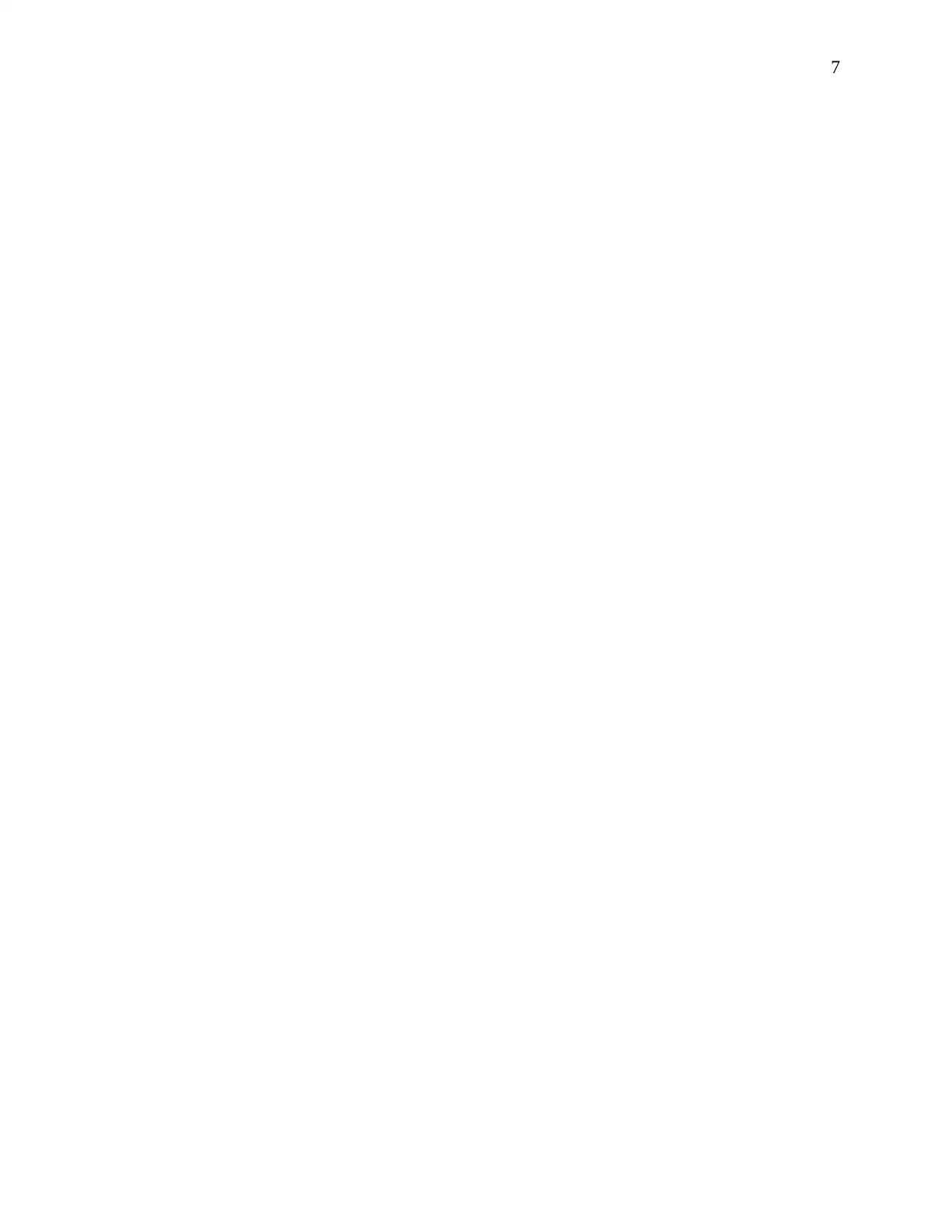
7
1 out of 7
Related Documents
Your All-in-One AI-Powered Toolkit for Academic Success.
+13062052269
info@desklib.com
Available 24*7 on WhatsApp / Email
![[object Object]](/_next/static/media/star-bottom.7253800d.svg)
Unlock your academic potential
Copyright © 2020–2026 A2Z Services. All Rights Reserved. Developed and managed by ZUCOL.





